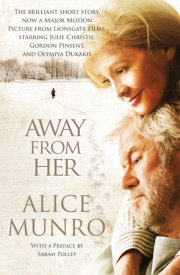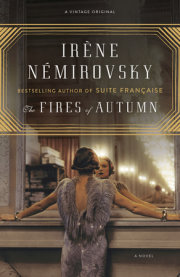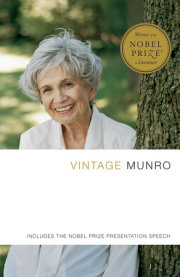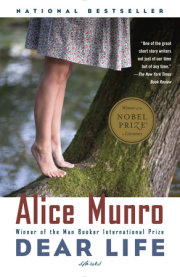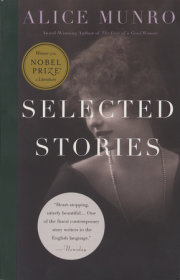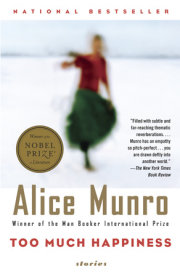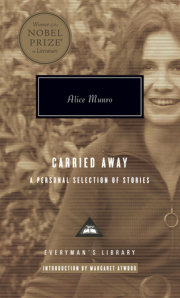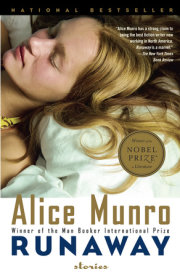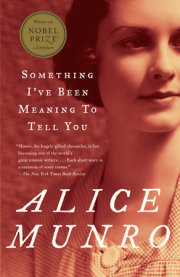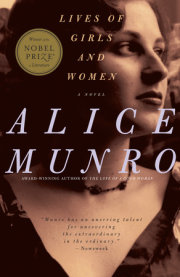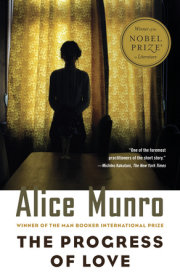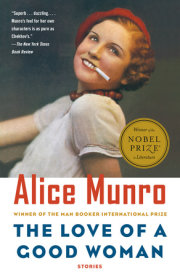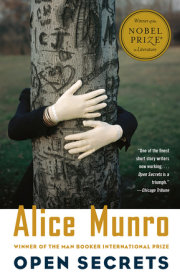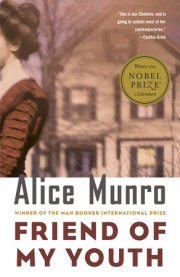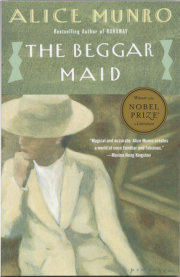The Bear Came Over the Mountain
Fiona lived in her parents' house, in the town where she and Grant went to university. It was a big, bay-windowed house that seemed to Grant both luxurious and disorderly, with rugs crooked on the floors and cup rings bitten into the table varnish. Her mother was Icelandic--a powerful woman with a froth of white hair and indignant far-left politics. The father was an important cardiologist, revered around the hospital but happily subservient at home, where he would listen to strange tirades with an absentminded smile. All kinds of people, rich or shabby-looking, delivered these tirades, and kept coming and going and arguing and conferring, sometimes in foreign accents. Fiona had her own little car and a pile of cashmere sweaters, but she wasn't in a sorority, and this activity in her house was probably the reason.
Not that she cared. Sororities were a joke to her, and so was politics, though she liked to play "The Four Insurgent Generals" on the phonograph, and sometimes also she played the "Internationale," very loud, if there was a guest she thought she could make nervous. A curly-haired, gloomy-looking foreigner was courting her--she said he was a Visigoth--and so were two or three quite respectable and uneasy young interns. She made fun of them all and of Grant as well. She would drolly repeat some of his small-town phrases. He thought maybe she was joking when she proposed to him, on a cold bright day on the beach at Port Stanley. Sand was stinging their faces and the waves delivered crashing loads of gravel at their feet.
"Do you think it would be fun--" Fiona shouted. "Do you think it would be fun if we got married?"
He took her up on it, he shouted yes. He wanted never to be away from her. She had the spark of life.
Just before they left their house Fiona noticed a mark on the kitchen floor. It came from the cheap black house shoes she had been wearing earlier in the day.
"I thought they'd quit doing that," she said in a tone of ordinary annoyance and perplexity, rubbing at the gray smear that looked as if it had been made by a greasy crayon.
She remarked that she would never have to do this again, since she wasn't taking those shoes with her.
"I guess I'll be dressed up all the time," she said. "Or semi dressed up. It'll be sort of like in a hotel."
She rinsed out the rag she'd been using and hung it on the rack inside the door under the sink. Then she put on her golden-brown fur-collared ski jacket over a white turtle-necked sweater and tailored fawn slacks. She was a tall, narrow-shouldered woman, seventy years old but still upright and trim, with long legs and long feet, delicate wrists and ankles and tiny, almost comical-looking ears. Her hair, which was light as milkweed fluff, had gone from pale blond to white somehow without Grant's noticing exactly when, and she still wore it down to her shoulders, as her mother had done. (That was the thing that had alarmed Grant's own mother, a small-town widow who worked as a doctor's receptionist. The long white hair on Fiona's mother, even more than the state of the house, had told her all she needed to know about attitudes and politics.)
Otherwise Fiona with her fine bones and small sapphire eyes was nothing like her mother. She had a slightly crooked mouth which she emphasized now with red lipstick--usually the last thing she did before she left the house. She looked just like herself on this day--direct and vague as in fact she was, sweet and ironic.
Over a year ago Grant had started noticing so many little yellow notes stuck up all over the house. That was not entirely new. She'd always written things down--the title of a book she'd heard mentioned on the radio or the jobs she wanted to make sure she did that day. Even her morning schedule was written down--he found it mystifying and touching in its precision.
7 a.m. Yoga. 7:30-7:45 teeth face hair. 7:45-8:15 walk. 8:15 Grant and Breakfast.
The new notes were different. Taped onto the kitchen drawers--Cutlery, Dishtowels, Knives. Couldn't she have just opened the drawers and seen what was inside? He remembered a story about the German soldiers on border patrol in Czechoslovakia during the war. Some Czech had told him that each of the patrol dogs wore a sign that said Hund. Why? said the Czechs, and the Germans said, Because that is a hund.
He was going to tell Fiona that, then thought he'd better not. They always laughed at the same things, but suppose this time she didn't laugh?
Worse things were coming. She went to town and phoned him from a booth to ask him how to drive home. She went for her walk across the field into the woods and came home by the fence line--a very long way round. She said that she'd counted on fences always taking you somewhere.
It was hard to figure out. She said that about fences as if it was a joke, and she had remembered the phone number without any trouble.
"I don't think it's anything to worry about," she said. "I expect I'm just losing my mind."
He asked if she had been taking sleeping pills.
"If I have I don't remember," she said. Then she said she was sorry to sound so flippant.
"I'm sure I haven't been taking anything. Maybe I should be. Maybe vitamins."
Vitamins didn't help. She would stand in doorways trying to figure out where she was going. She forgot to turn on the burner under the vegetables or put water in the coffeemaker. She asked Grant when they'd moved to this house.
"Was it last year or the year before?"
He said that it was twelve years ago.
She said, "That's shocking."
"She's always been a bit like this," Grant said to the doctor. "Once she left her fur coat in storage and just forgot about it. That was when we were always going somewhere warm in the winters. Then she said it was unintentionally on purpose, she said it was like a sin she was leaving behind. The way some people made her feel about fur coats."
He tried without success to explain something more--to explain how Fiona's surprise and apologies about all this seemed somehow like routine courtesy, not quite concealing a private amusement. As if she'd stumbled on some adventure that she had not been expecting. Or was playing a game that she hoped he would catch on to. They had always had their games--nonsense dialects, characters they invented. Some of Fiona's made-up voices, chirping or wheedling (he couldn't tell the doctor this), had mimicked uncannily the voices of women of his that she had never met or known about.
"Yes, well," the doctor said. "It might be selective at first. We don't know, do we? Till we see the pattern of the deterioration, we really can't say."
In a while it hardly mattered what label was put on it. Fiona, who no longer went shopping alone, disappeared from the supermarket while Grant had his back turned. A policeman picked her up as she walked down the middle of the road, blocks away. He asked her name and she answered readily. Then he asked her the name of the prime minister of the country.
"If you don't know that, young man, you really shouldn't be in such a responsible job."
He laughed. But then she made the mistake of asking if he'd seen Boris and Natasha.
These were the Russian wolfhounds she had adopted some years ago as a favor to a friend, then devoted herself to for the rest of their lives. Her taking them over might have coincided with the discovery that she was not likely to have children. Something about her tubes being blocked, or twisted--Grant could not remember now. He had always avoided thinking about all that female apparatus. Or it might have been after her mother died. The dogs' long legs and silky hair, their narrow, gentle, intransigent faces made a fine match for her when she took them out for walks. And Grant himself, in those days, landing his first job at the university (his father-in-law's money welcome in spite of the political taint), might have seemed to some people to have been picked up on another of Fiona's eccentric whims, and groomed and tended and favored. Though he never understood this, fortunately, until much later.
She said to him, at suppertime on the day of the wandering-off at the supermarket, "You know what you're going to have to do with me, don't you? You're going to have to put me in that place. Shallowlake?"
Grant said, "Meadowlake. We're not at that stage yet."
"Shallowlake, Shillylake," she said, as if they were engaged in a playful competition. "Sillylake. Sillylake it is."
He held his head in his hands, his elbows on the table. He said that if they did think of it, it must be as something that need not be permanent. A kind of experimental treatment. A rest cure.
There was a rule that nobody could be admitted during the month of December. The holiday season had so many emotional pitfalls. So they made the twenty-minute drive in January. Before they reached the highway the country road dipped through a swampy hollow now completely frozen over. The swamp-oaks and maples threw their shadows like bars across the bright snow.
Fiona said, "Oh, remember."
Grant said, "I was thinking about that too."
"Only it was in the moonlight," she said.
She was talking about the time that they had gone out skiing at night under the full moon and over the black-striped snow, in this place that you could get into only in the depths of winter. They had heard the branches cracking in the cold.
So if she could remember that so vividly and correctly, could there really be so much the matter with her?
It was all he could do not to turn around and drive home.
There was another rule which the supervisor explained to him. New residents were not to be visited during the first thirty days. Most people needed that time to get settled in. Before the rule had been put in place, there had been pleas and tears and tantrums, even from those who had come in willingly. Around the third or fourth day they would start lamenting and begging to be taken home. And some relatives could be susceptible to that, so you would have people being carted home who would not get on there any better than they had before. Six months later or sometimes only a few weeks later, the whole upsetting hassle would have to be gone through again.
"Whereas we find," the supervisor said, "we find that if they're left on their own they usually end up happy as clams. You have to practically lure them into a bus to take a trip to town. The same with a visit home. It's perfectly okay to take them home then, visit for an hour or two--they're the ones that'll worry about getting back in time for supper. Meadowlake's their home then. Of course, that doesn't apply to the ones on the second floor, we can't let them go. It's too difficult, and they don't know where they are anyway."
"My wife isn't going to be on the second floor," Grant said.
"No," said the supervisor thoughtfully. "I just like to make everything clear at the outset."
They had gone over to Meadowlake a few times several years ago, to visit Mr. Farquar, the old bachelor farmer who had been their neighbor. He had lived by himself in a drafty brick house unaltered since the early years of the century, except for the addition of a refrigerator and a television set. He had paid Grant and Fiona unannounced but well-spaced visits and, as well as local matters, he liked to discuss books he had been reading--about the Crimean War or Polar explorations or the history of firearms. But after he went to Meadowlake he would talk only about the routines of the place, and they got the idea that their visits, though gratifying, were a social burden for him. And Fiona in particular hated the smell of urine and bleach that hung about, hated the perfunctory bouquets of plastic flowers in niches in the dim, low-ceilinged corridors.
Now that building was gone, though it had dated only from the fifties. Just as Mr. Farquar's house was gone, replaced by a gimcrack sort of castle that was the weekend home of some people from Toronto. The new Meadowlake was an airy, vaulted building whose air was faintly pleasantly pine-scented. Profuse and genuine greenery sprouted out of giant crocks.
Nevertheless, it was the old building that Grant would find himself picturing Fiona in during the long month he had to get through without seeing her. It was the longest month of his life, he thought--longer than the month he had spent with his mother visiting relatives in Lanark County, when he was thirteen, and longer than the month that Jacqui Adams spent on holiday with her family, near the beginning of their affair. He phoned Meadow-lake every day and hoped that he would get the nurse whose name was Kristy. She seemed a little amused at his constancy, but she would give him a fuller report than any other nurse he got stuck with.
Fiona had caught a cold, but that was not unusual for newcomers.
"Like when your kids start school," Kristy said. "There's a whole bunch of new germs they're exposed to, and for a while they just catch everything."
Then the cold got better. She was off the antibiotics, and she didn't seem as confused as she had been when she came in. (This was the first time Grant had heard about either the antibiotics or the confusion.) Her appetite was pretty good, and she seemed to enjoy sitting in the sunroom. She seemed to enjoy watching television.
One of the things that had been so intolerable about the old Meadowlake had been the way the television was on everywhere, overwhelming your thoughts or conversation wherever you chose to sit down. Some of the inmates (that was what he and Fiona called them then, not residents) would raise their eyes to it, some talked back to it, but most just sat and meekly endured its assault. In the new building, as far as he could recall, the television was in a separate sitting room, or in the bedrooms. You could make a choice to watch it.
So Fiona must have made a choice. To watch what?
Copyright © 2007 by Alice Munro. All rights reserved. No part of this excerpt may be reproduced or reprinted without permission in writing from the publisher.


